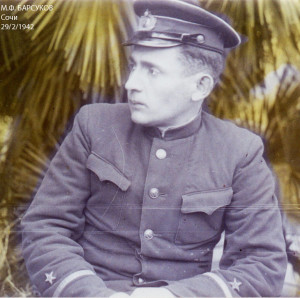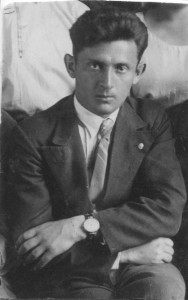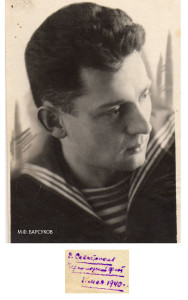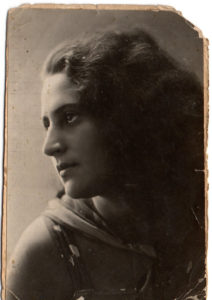As far as I know, my father Mois Barsukov was in the military for nine years; he was a submariner and an officer in the marines. Shortly after my parents were married in 1939, my father was sent to fight in the war between Finland and the USSR. There was no break for him between this war and what Russians call The Great Patriotic War or The Great War for the Homeland—the USSR’s war with Germany.


In 1944 my father was wounded with a concussion and was sent to Tbilisi, Georgia, and my mother joined him there; it must have been their first opportunity to spend much time together. After my father was well enough to work he was assigned to teach in a military school called Nahimovskoye Uchilische. He taught astronomy among other things. He was teaching at this school when I was born, just a few months after the Great Patriotic war was over. I was born in January 1945 in a private house on Krilov Street in Tbilisi.
This school where my father worked was a military academy for orphaned boys. There were five or six such campuses in different cities. The goal of these schools was to take boys from the streets and turn them into well-educated and physically trained officers. The boys even learned ballroom dancing. Some of these schools are still in existence, but the one in Tbilisi where my father taught closed in 1955. Unfortunately the archives of the school are lost, but some enthusiastic former students have started a website. They are collecting pictures and documents and trying to build up a history of the school.
I ran across their website one day and sent an email to the webmaster. I was surprised to get a warm reply from a real person: Valentine Maximov, nicknamed “Fregat” (frigate). I’ve had several long email exchanges with him, and he has shown strong interest in learning about my father. He asked for photos and dates, and then finally he asked me what my father was called. This caused me to pause.
 My father’s full name was Mois Itshok Fiselevitch Barsukov. Barsukov is not a Jewish name; it’s a Russian name, and how my father’s family came to have that name is a puzzle to me, because we are Jewish. The rest of my father’s name–Mois Itshok Fiselevitch–is clearly and obviously Jewish. Also, my father often went by two different first names: Mishe or Sashe. Not Mois. And what is more, some people called him by the middle name Fyodorovitch instead of Fiselevitch. These other names (Mishe, Sashe, and Fyodorovitch) do not sound Jewish—they would be more typical for a Russian than a Jew. So when Fregat asked my father’s name I was uncertain how to answer. I worried that if I told him my father’s real name he would not want to deal with me because of the anti-Semitism that is still so common in Russia. And besides that, I don’t actually know what my father called himself at that time.
My father’s full name was Mois Itshok Fiselevitch Barsukov. Barsukov is not a Jewish name; it’s a Russian name, and how my father’s family came to have that name is a puzzle to me, because we are Jewish. The rest of my father’s name–Mois Itshok Fiselevitch–is clearly and obviously Jewish. Also, my father often went by two different first names: Mishe or Sashe. Not Mois. And what is more, some people called him by the middle name Fyodorovitch instead of Fiselevitch. These other names (Mishe, Sashe, and Fyodorovitch) do not sound Jewish—they would be more typical for a Russian than a Jew. So when Fregat asked my father’s name I was uncertain how to answer. I worried that if I told him my father’s real name he would not want to deal with me because of the anti-Semitism that is still so common in Russia. And besides that, I don’t actually know what my father called himself at that time.
So in the end I only gave the last name and unfortunately my father’s name has not been found yet among the documents about that school.
My father was always attracted to and attractive to women. He married more than once, but for as long as I knew him, he always carried a picture of my mother in his wallet and her picture hung on the wall of his apartment.



